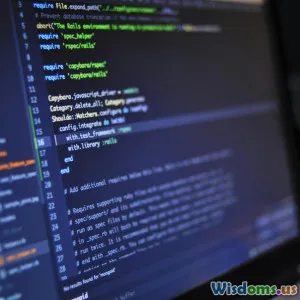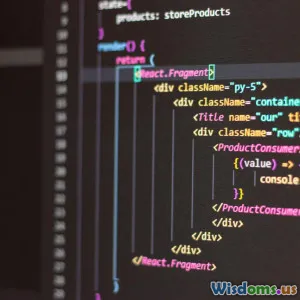
Navigating Software Development Ethics
7 min read Explore the vital principles and challenges of ethics in software development and learn how to make responsible tech choices. (0 Reviews)
Navigating Software Development Ethics
In an era when software touches nearly every facet of daily life—from banking and healthcare to communication and entertainment—the ethical responsibility of software developers has never been more critical. Technology shapes our society massively, often with consequences that extend beyond immediate functionality or profit. But what does it truly mean to navigate software development ethics, and why should programmers, project managers, and tech companies prioritize it?
Why Ethics Matter in Software Development
Software isn’t just lines of code; it’s a powerful tool that influences behavior, privacy, security, and equity. Ethical lapses can result in significant harm, ranging from invasions of privacy to perpetuating social biases or even enabling dangerous autonomous systems. For example, the Cambridge Analytica scandal, wherein Facebook data was harvested without consent to influence elections, revealed how ethical oversight can have global political consequences.
A 2023 study by the IEEE found that 68% of software professionals witnessed ethically questionable decisions at their workplace, highlighting a need for better frameworks and education on ethical issues.
Core Ethical Principles in Software Development
1. Respect for Users’ Privacy and Data Security
One of the most pressing concerns is how user data is collected, stored, and used. Ethical developers advocate for transparency and consent. Consider Apple’s recent emphasis on privacy labels on apps, which pushes developers to be explicit about how they collect user data.
2. Accuracy and Fairness in Algorithms
Algorithmic bias can lead to unfair treatment of minorities or marginalized groups. For instance, facial recognition systems have been criticized for higher error rates with darker skin tones, a reflection of training data bias. Ethical responsibility demands continuous auditing and mitigation strategies to avoid perpetuating social inequities.
3. Accountability and Transparency
Developers must be accountable for their code’s impact. The more complex software becomes, the harder it is to trace decisions when errors occur. For example, in autonomous vehicles, clear accountability for malfunctions is critical. Transparency about software behavior fosters trust and facilitates ethical review.
4. Commitment to Safety and Security
Programming code that impacts critical infrastructure or healthcare must prioritize safety rigorously. Bugs in medical software have, in the past, caused dangerous misdiagnoses. Developers hold an ethical obligation to maintain the highest standards for software quality and security.
Navigating Real-World Ethical Challenges
Ethical Dilemmas in Artificial Intelligence
AI development presents novel challenges. Should developers enable AI to make decisions about life-critical situations? For example, in medical diagnostics, AI can assist but should not replace expert judgment without oversight, as erroneous conclusions may be fatal.
Open Source and Community Responsibilities
Open-source software powers much of today’s tech stack. However, ethical risks include the introduction of malicious code or poorly maintained projects leading to vulnerabilities exploited by bad actors. Communities managing OSS projects increasingly focus on responsible disclosure policies and community codes of conduct.
Corporate Pressures versus Ethical Priorities
Developers often face pressures to deliver features rapidly, potentially sidelining ethical considerations. Uber’s self-driving car fatality case exposed how rushing technology deployment without rigorous ethical checks can result in loss of human life.
Best Practices for Ethical Software Development
Embedding Ethics in the Development Lifecycle
Integrating ethical review checkpoints from initial design through deployment ensures considerations stay front and center. Approaches such as ethical hackathons or bias audits prove effective.
Continuous Education and Awareness
Ethics isn’t static. Developers and organizations should engage in ongoing training and discussions, staying updated with evolving societal standards and emerging tech impacts.
Collaboration With Multidisciplinary Teams
Bringing ethicists, domain experts, and affected community members into development projects provides broader perspectives. For instance, healthcare software benefits from collaboration between clinicians and ethicists.
Building Transparent Documentation
Clear documentation about software capabilities, limitations, and data usage policies empowers users and regulators to make informed decisions. Mozilla Firefox’s commitment to clear privacy policies exemplifies this practice.
Conclusion
Ethics in software development is not merely an abstract ideal but a foundational element for responsible innovation. As software creators, developers wield significant influence over social norms, human rights, and global wellbeing. By prioritizing privacy, fairness, accountability, and safety throughout the development process, tech professionals can build trust and deliver technology that empowers rather than endangers society. Embracing ethical frameworks will ultimately distinguish the leaders of tomorrow’s digital world — those guided by conscience and commitment alongside code.
Recommended Action: Developers and organizations must institute ethical codes, encourage open dialogue on dilemmas, and partner widely to create software that respects humanity’s diverse needs.
Only then can technology fulfill its profound potential as a force for good.
“Our moral duties as developers extend beyond code—it’s about shaping the values of the future.” — A Leading Software Ethicist
References:
- IEEE Global Survey on Software Ethics, 2023
- Case study: Cambridge Analytica data misuse
- Privacy labeling initiatives by Apple
- Bias in AI and Facial Recognition Research
- Uber Autonomous Vehicle Incident Reports
- Mozilla Privacy Policies
Rate the Post
User Reviews
Popular Posts




















